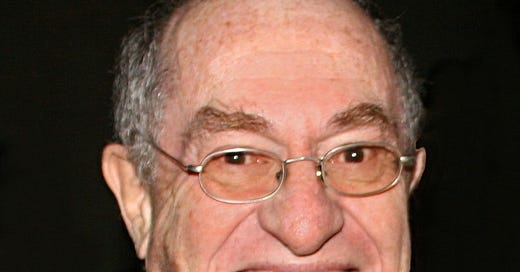SLAPP and anti-SLAPP: Netflix hits back at Alan Dershowitz
The attorney who helped Jeffrey Epstein get a sweetheart deal from prosecutors and allegedly had sex with one of Epstein's teenage victims is still protesting too much.
In May of this year, attorney Alan Dershowitz, whose competition to be one of the most despicable men in America never lets up, sued Netflix and the producers of the documentary “Filthy Rich” for defamation. The producers of the four-part series, about the crimes of Jeffrey Epstein and those who enabled them, made every effort to be fair to Dershowitz—despite the seriousness of the sexual abuse accusations against him by Virginia Roberts Giuffre, which are the subject of yet other lawsuits.
(Last week I wrote about Miami Herald reporter Julie K. Brown’s new book about the Epstein case, “Perversion of Justice,” as well as some issues about how the media covers #MeToo cases.)
But Dershowitz apparently thought the only way the producers could have been fair would have been to exonerate him. At least, that is the way the Complaint in the case seems to read. Here is how he put it:
2. Defendants knowingly and deliberately misled Professor Dershowitz as to their intentions for his participation in the series, and maliciously and intentionally portrayedProfessor Dershowitz in a defamatory manner by (i) promoting and bolstering false allegations of sexual misconduct against Professor Dershowitz, and (ii) not presenting evidence in the Netflix Epstein series that they received and agreed to present, which showed that alleged Epstein victim Virginia Giuffre, nee Roberts (“Giuffre”) was “wrong, simply, wrong” (in the words of her own lawyer) to have accused Professor Dershowitz of sexual impropriety and that Professor Dershowitz did not have sex with her as she has falsely alleged. The portion of Filthy Rich concerning Giuffre’s false allegations against Professor Dershowitz presented anew those allegations and was not a report of proceedings in any litigation.
On August 2, Netflix and the producers filed their response (“Answer”) to Dershowitz’s Complaint, in which they denied each and every allegation. But they went much further than that. Although Dershowitz’s lawsuit was filed in the United States District Court for the Southern District of Florida, where Dershowitz now lives, Netflix and its fellow defendants invoked New York’s new legislation against frivolous lawsuits designed to stifle public speech, otherwise known by the unwieldy name of Strategic Lawsuits Against Public Participation (SLAPP for short.) The legislation, signed by outgoing governor Andrew Cuomo last November, is what is known as an anti-SLAPP law. Fortunately, more and more states in the U.S. now have them, and some legislators are arguing for more uniform legislation so that these state laws will be more easily enforceable in federal courts.
As for why the laws of New York should apply to a lawsuit that was brought in federal court in Florida, Netflix et al. explain in their counterclaim:
15. The laws of the state of New York apply to the subject matter of this action, as was expressly agreed in the Appearance Release (the “Release”) between Dershowitz and the Leroy Defendants. See Ex. 1. Further, New York has the most significant relationship to this litigation— the filmmakers produced the series from New York, Dershowitz maintains an apartment in New York, and the relevant interview with Dershowitz, where Dershowitz alleges he provided the Leroy Defendants with pierces of “evidence,” took place in New York.
Netflix and its fellow defendants argue in their anti-SLAPP counterclaim that Dershowitz’s lawsuit was designed solely to “chill speech on an issue of public interest” and that its reporting was based entirely on court documents that were already a matter of public record. Nevertheless, the counterclaim states,
5. Nevertheless, Dershowitz tried to manipulate the Filthy Rich filmmakers so that he could control how they reported on his litigation with Giuffre. Even before Filthy Rich was released, Dershowitz made clear that he would sue over his portrayal in the Series unless his story was told in the exact manner he wanted. And when he realized that Filthy Rich would not be used as a vehicle to tell only his side of the story, he brought this current lawsuit seeking to suppress Netflix’s speech on matters of public concern.
Nearly all anti-SLAPP legislation, including New York’s, allow for the winner to collect attorney’s fees, court costs, and damages (including possibly punitive damages) for bringing a frivolous lawsuit designed to shut up defendants who are simply exercising their First Amendment rights. Netflix is asking the court for that relief as well.
As a journalist who has been threatened with lawsuits 10 times in the past six years—and actually been sued for defamation recently, in the Southern District of New York—the growing movement to bring anti-SLAPP actions against those who use the courts to try to shut others up has my full sympathy. It should have yours too.




